Newsletter
Issue 6 Summer 2006

|
Newsletter |
 |
|
2,200 PATIENTS
RANDOMISED
|
|
|
The Data Monitoring Committee convened on August 3rd and reviewed data on more than 1,800 randomised patients. The Committee commended the collaborators on the excellent recruitment and it was the view of the committee that “the interim analyses provided no reason for modifying the CRASH-2 protocol on the basis of safety or efficacy.” This is excellent news. The message that we should take from it is very clear – we must keep recruiting centres and patients until we answer the trial question. July was a very busy month for the CRASH-2 trial with a series of collaborators meetings and data audits in hospitals throughout Colombia and Ecuador. Particular thanks to Miguel Arango, Regional Co-ordinator, Jorge Mejia-Mantilla, National Co-ordinator for Colombia and Mario Izurieta, National Co-ordinator for Ecuador for setting up the meetings and data audits, and to the hospital collaborators for ensuring that all the hospital notes were available. Data audits involve comparing the trial data with the data in the hospital records to make sure that our data are accurate. The data were found to be highly accurate which attests to the hard work and integrity of the trial collaborators but also to the large trial model of stream- lining data collection such that we collect less data but the most important data. |
|
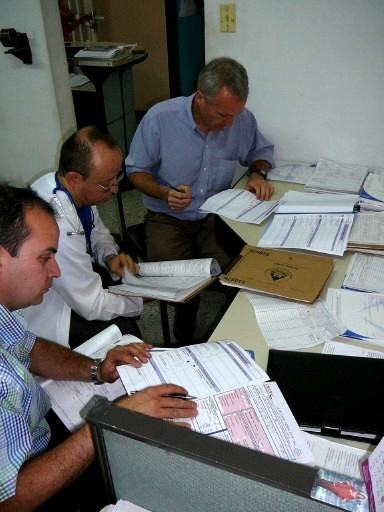 Data audit in progress in Hospital San Jorge, Colombia |
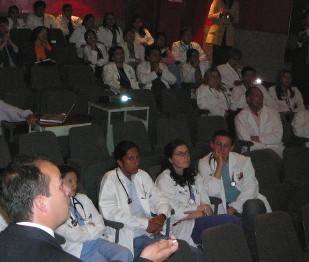 Miguel Arango presenting to doctors in Hospital San Rafael, Colombia |
|
Thanks to the hard work of the Nigerian National Co-ordinator Edward Komolafe we now have 18 participating hospitals in Nigeria and recruitment is increasing rapidly. A Nigerian national collaborators meeting is scheduled for late September in Ile Ife. The other big news is that we now have more than 2,000 randomised patients and the recruitment graph is curving steeply upward. Every patient counts and every patient adds to medical knowledge. All strength to the collaborators! |
|
| update
on PLoS submission
PLoS
Clinical Trials (a new open access journal) asked us to refocus the original
submission. We have rewritten the manuscript which is now titled “Progress
in the international multi-centre randomised controlled trial of an antifibrinolytic
in significant traumatic haemorrhage (CRASH-2 Trial)”.
In this we discussed the progress of the trial in the first year and also
reviewed the demographic data of the first 1,500 patients. It has been
accepted for publication as a 'frontmatter' piece. We will let you know
when it is published and available online. |
The BUPA Foundation and the Moulton Charitable Foundation have provided much needed financial support for the initial phase of the trial.
|
| keep it in the family | |
|
|
Good news from Georgia: our National Co-ordinator Tamar Gogichaishvili from Tbilisi State Medical University Central Clinic, married Besik Melikidze from the same hospital on 20 May 2006. Tamar is leading the trial in the neurosurgery department and the general surgery department will join very soon, with Besik taking the lead. |
| IN MEMORY OF A VALUED
COLLABORATOR Irene Zamalea Bess 3 July 1939 – 28 April 2006 |
|
Irene
Zamalea was a very special person. She was the first woman to become
a neurosurgeon in our country and in Latin America. Since 1966 when
she graduated as a physician, she devoted her life to help the suffering
people not only in Cuba but also in Angola, Tanzania and Nicaragua where
her work was invaluable. She distinguished as a collaborator in the
MRC CRASH trial at Hospital Miguel Enriquez with her enthusiasm, interest
and great contribution. An aggressive lung cancer ended her fruitful
life before she had a chance to take part in this new trial.
Irene Zamalea will be sorely missed by the CRASH2 trial. She had already obtained ethics approval for Hospital Miguel Enriquez. The trial is co-ordinated in Cuba by CENCEC (Centro Nacional Coordinador de Ensayos Clinicos), led by Maria Amparo Pascual Lopez and her team. CENCEC held a national collaborators meeting in July and nine hospitals are ready to start pending national approval. |
|
crash-2 in mexico Emergency
medicine has been a medical speciality in Mexico already for 20 years,
but one of its limitations has been the paucity of research activities
conducted by emergency doctors. The
Hospital General Regional 25 del Instituto Mexicano
del Seguro Social is one of the teaching hospitals of emergency
medicine and in order to get more involved in research we expressed our
interest to participate in the MRC CRASH Trial. Unfortunately We accepted enthusiastically the invitation to participate in the CRASH-2 trial, and although we made our best effort to speed the procedures it took us more than one year to obtain the final approval. All these hassles may have discouraged some of the centres who initially expressed interest in participating in the CRASH-2 trial. However, I have to admit that I have been pleasantly surprised by how easy it is to conduct the trial once all the legal procedures are over. The recruitment, the drug administration, the filling of the forms and the follow-up of the patients is really agile and dynamic, and because of this the whole team including nurses, residents and doctors have became really interested in the trial. We hope that soon other hospitals in Mexico can join us in this important collaboration which can have an enormous impact in the medical care of an increasing public health problem such as trauma. Jorge Loría-Castellanos, National Co-ordinator, Mexico |
 |
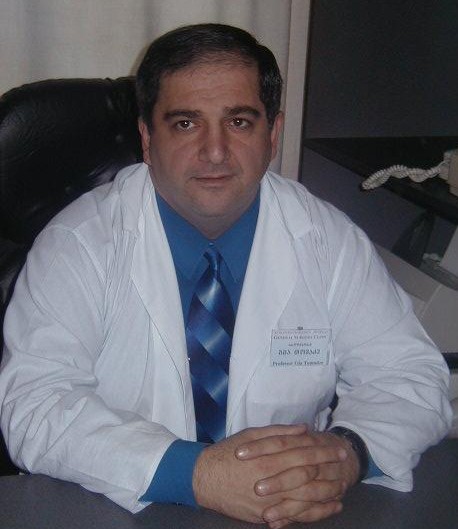 |
Gia
Tomadze from the General Surgery Clinic of Tbilisi City Hospital #1, Georgia,
tells about his CRASH2 trial experience: Gia Tomadze |
|
With the release of issue 4, 2006 of The Cochrane Library in October, the Cochrane Injuries Group will have published a total of 104 protocols and completed systematic reviews of the evidence for the effectiveness of interventions in the prevention, treatment and rehabilitation of traumatic injury. The Group has titles on a broad range of subjects such as head injury, spinal cord injury, emergency medicine and multi-system trauma to name a few. For example, some of the published reviews include: Barbiturates for acute traumatic brain injury; Calcium channel blockers for acute traumatic brain injury; Colloids versus crystalloids for fluid resuscitation in critically ill patients; Naloxone for shock; Nutritional support for head-injured patients; Steroids for acute spinal cord injury; Therapeutic hypothermia for head injury. Full texts of all of our reviews and protocols are published on www.thecochranelibrary.com. For a complete list of titles please visit www.cochrane-injuries.lshtm.ac.uk If you are interested in becoming a member of the Cochrane Injuries Group and/or in undertaking a systematic review, email the Review Group Co-ordinator Katharine Ker at katharine.ker@lshtm.ac.uk |
| CRASH2 teams around the world |
|
|
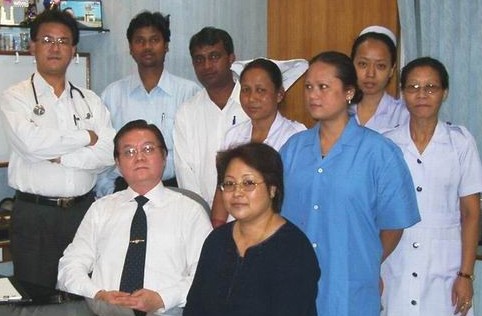 “It
is a great honour to be a part of the CRASH2 Trial. We will sincerely
participate and randomise as many patients as possible.” Wu
Hoong Chhang and his team at North Bengal Neuro Research Centre, India
|
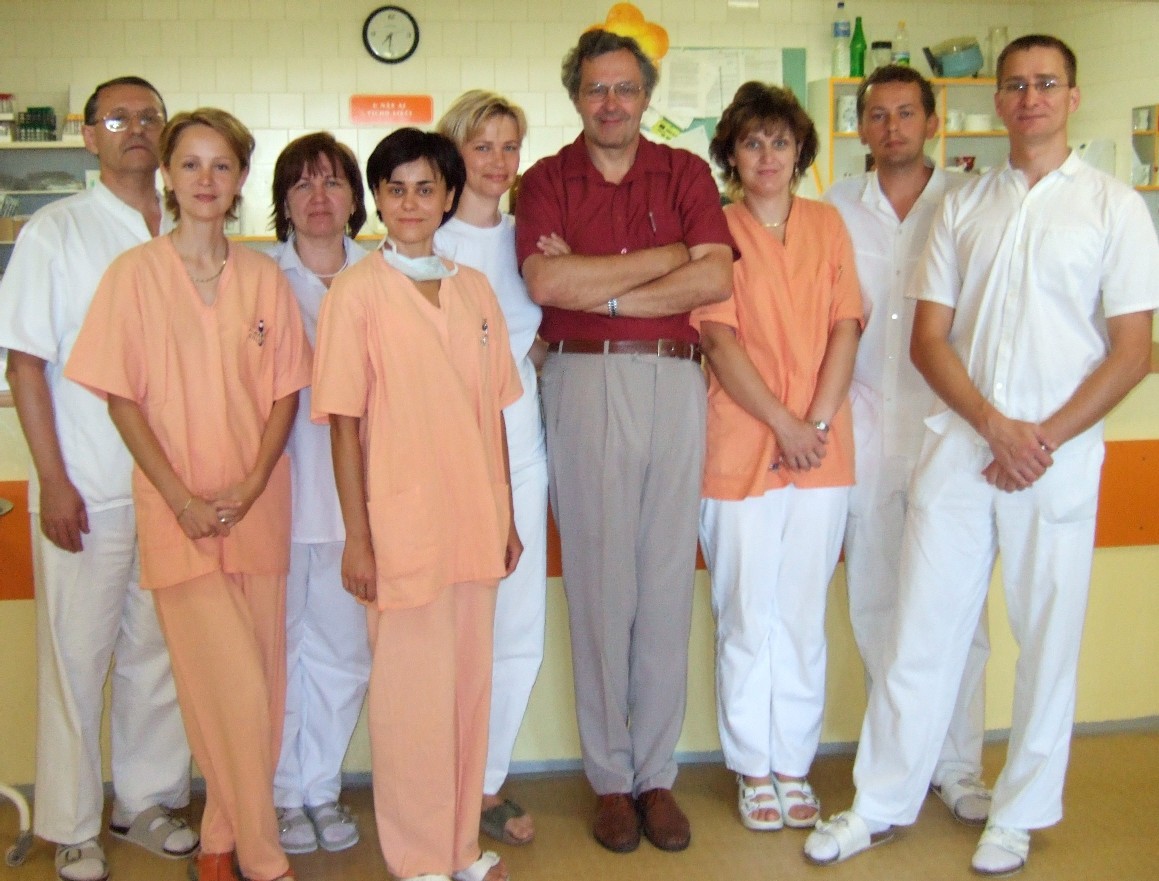 Stefan Trenkler, Slovakia national co-ordinator, and team of NsP JA Reiman Hospital, Slovakia |
| new randomisers - great start! | |
|
Hernan
Delgado, Hospital San Andres de Tumaco, Colombia |
| new ethics approvals - welcome to the trial! |
|
Andrés
Villarreal, Fundacion Hospital San Jose de Buga, Colombia |
| special mentions |
|
Congratulations and many thanks to all of the following for relentlessly keeping the randomisation going: 250
randomised patients 100
randomised patients 50
randomised patients |
|
The 2,000th patient was randomised by Oluwole Olaomi in National Hospital Abuja. Many congratulations to the team - the £200 prize has been sent to them. Team
pictured below with Olaomi in the front row second from the left |